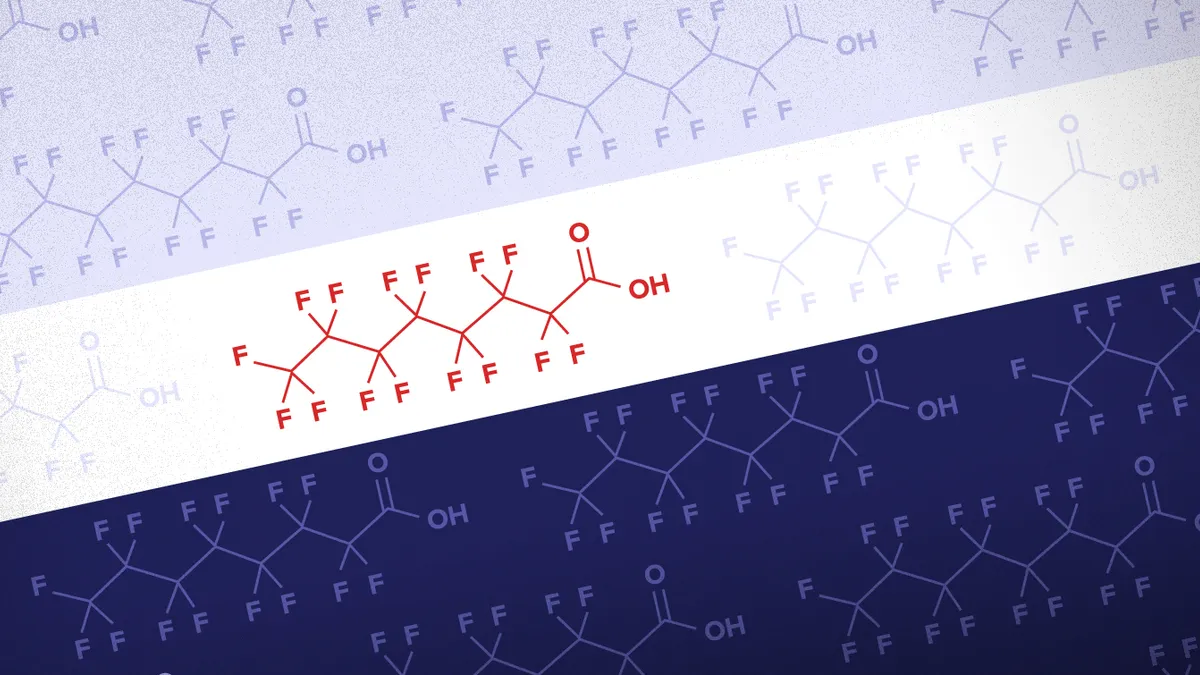Dive Brief:
- As fast food chains face lawsuits related to PFAS in packaging, and numerous states prepare to enact related packaging bans, restaurant franchisors should consider proactively changing their foodware offerings, attorneys recommended during an Aug. 10 webinar from legal services firm Lathrop GPM.
- Franchisors must closely monitor upcoming changes to state regulations, which could dictate how they source or purchase items like cups, takeout containers and other food serviceware — and what kinds of products eventually end up in disposal sites, they said.
- Ten states have passed laws banning intentionally-added PFAS in packaging, with New York’s law taking effect at the end of the year. With more such laws expected to pass in the next few years, experts suggested finding PFAS-free packaging alternatives, even if businesses are complying with current state and local regulations related to per- and polyfluoroalkyl substances.
Dive Insight:
Those in the waste, organics, recycling and landfill industry have long advocated for manufacturers and businesses to phase out PFAS-containing items to stem the flow of such material into disposal sites. The tactic is seen as a preventive measure that could reduce overall costs of treating PFAS down the road.
Ally Cunningham, a partner at Lathrop GPM who focuses on PFAS and other environmental litigation, said the general public is becoming more informed and aware about the possible health impacts of PFAS and are asking more and more for PFAS-free alternatives.
In response, some companies, such as McDonald’s and Burger King, have announced voluntary phaseouts of PFAS in packaging by 2025. Recently, Starbucks announced it would eliminate PFAS in its U.S. packaging by the end of the year.
However, both McDonald’s and Burger King, along with fast casual Mediterranean chain Cava, are the subject of lawsuits after a recent report from Consumer Reports found significant levels of PFAS in the chains’ packaging. The lawsuits allege false advertising and deceptive business practices, and Cunningham expects that additional restaurants could become part of the “significant flurry” of litigation.
These lawsuits are aimed at the corporate level, meaning smaller, individual eateries may not have to brace for the same type of litigation, added Craig Miller, a Lathrop partner who specializes in franchise litigation. However, franchises may start actively reducing or eliminating PFAS in packaging to mitigate the risk of future legal trouble, even if the restaurants are currently following all local and federal regulations, he said.
Miller suggested talking to suppliers, manufacturers and distributors to determine what’s in existing packaging, then reviewing any related supply contracts to see if changes need to be made. Restaurants may be able to identify alternatives for some types of packaging.
Another major reason for restaurants to reexamine food packaging is a wave of upcoming state legislation, said Matt Walker, a Lathrop associate focused on environmental regulations. Several state and local governments have passed laws to phase PFAS out of consumer goods and food packaging, with New York’s law scheduled to take effect by the end of the year. California, Connecticut, Hawaii and Vermont are set to enact their bans in 2023. Colorado, Maryland and Minnesota will follow in 2024. Washington and Maine are in the process of identifying PFAS-free packaging alternatives and will set the ban timelines based on state findings. Washington will start by banning five types of packaging starting in May 2024.
At the federal level, the Keep Food Containers Safe From PFAS Act aims to ban intentionally-added PFAS in food packaging nationwide by 2024. In June, the bill was included as an amendment to the FDA Safety and Landmark Advancements Act. The bill recently cleared the Senate Health, Education, Labor, and Pensions committee.
More states are anticipated to pass similar laws in the future, Cunningham said. “Even if you aren’t going to be sued, there's a wave of regulations coming where you may not be able to use these PFAS-containing products in any event,” she said.
Along with anticipated packaging bans, PFAS regulatory activity is likely from the U.S. EPA, which is expected to designate certain PFAS as hazardous substances and set drinking water standards for certain PFAS sometime next year. Waste facility operators consider these key decisions for determining how to measure, manage or dispose of PFAS-containing items in the future.











